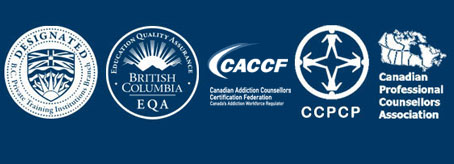Educational Requirements and Career options in the Mental Health Field
 Those of you considering a career as a mental health professional have a broad range of options to choose from. To help you make an informed career choice, here is an overview of qualifications and job opportunities available for various types of practitioners.
Those of you considering a career as a mental health professional have a broad range of options to choose from. To help you make an informed career choice, here is an overview of qualifications and job opportunities available for various types of practitioners.
Professional Counsellor, (sometimes referred to as a generalist or mental health worker), works for community agencies, or in private practice. Depending on the position, a professional counsellor possesses either a Diploma in Professional Counselling (1 or 2 year college training program) or a Bachelor’s degree (4 years of University education). Professional accreditation through a professional association or regulatory college is advised. KCPC’s Diploma Programs are approved by a number of recognized professional associations registered in Canada.
Addiction Counsellor (also referred to as an addiction worker) completes a 1 or 2 year Diploma program in Addictions Counselling. Depending on place of employment,a bachelor’s degree may also be required. Entry-level Addiction Counsellors are trained in all aspects of general counselling plus addiction-related treatments. Employment is available in private practice, hospitals, community clinics, treatment centers, and correctional institutions. The Canadian Addiction Counsellors Certification Federation (CACCF) certifies addiction training programs based on international standards of practice. KCPC’s Diploma in Addiction Counselling has been granted formal approval by the CACCF.
Psychotherapists and Counselling Therapists must complete a bachelor’s degree with a 1 or 2 year Diploma in advanced coursework specializing in Psychotherapy or Counselling Therapy. A Masters Degree relevant to advanced-level practitioners may also be required, followed by two years of supervised experience in the use of advanced assessment skills, and techniques to demonstrate level of competence. Employment is available in outpatient clinics, private practice, and community agencies. Professional accreditation is available through professional associations and/or regulatory colleges.
Check with your home province for specific requirements that may apply.
Social Worker is required to have either a Bachelor’s Degree (3-5 years of University) or Master’s Degree in Social Work (5-6 years of University), and is licensed by the provincial government. Social workers are typically employed in government agencies, hospitals or private positions requiring community and individual support interventions, and research. Certification through a regulatory college is required.
Clinical Psychologist, licensed by each provincial government, the education may vary from a Masters degree (5-6 years of university plus internship), to Doctorate (Ph.D.) degree. (8-10 years of University education, plus internship). Because of the extensive education required, employment options stretch across the field of mental health. In addition to the careers mentioned above, psychologists testify in court, perform psychological testing, custody evaluations, work in psychiatric hospitals, business settings, are involved in research, as school psychologists, community psychologists, and in private practice. Certification through a regulatory college is required.
Psychiatrist is a medical doctor and requires a degree in medicine (8-10 years of University, plus internship & residency). Psychiatrists treat patients suffering from various forms of mental illness in hospitals, outpatient clinics and private practice settings. Working independently or as part of a treatment team, psychiatrists prescribe medications, conduct psychotherapy, and supervise/consult with other professionals. Certification through a regulatory college is required.






